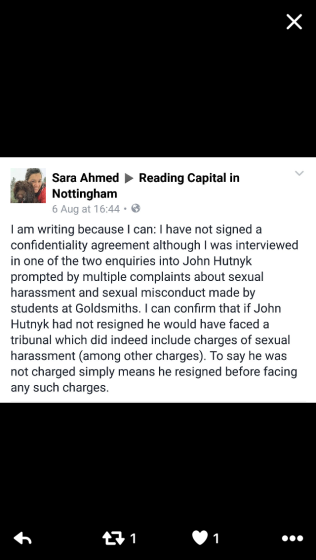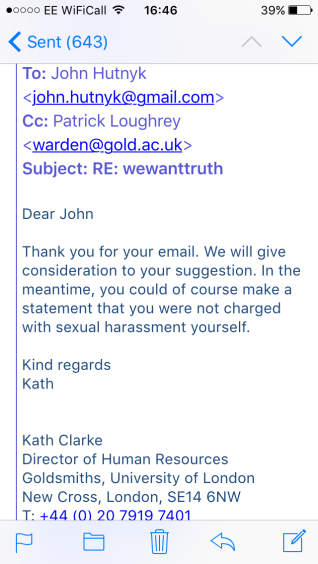There is a nasty, Kafkaesque, McCarthyite, and cruel tendency at work within academia in general and Goldsmiths in particular. It is dangerous in its stupidity. It is sociopathic in its willingness to turn language on its head. It perverts critical theory to make bullying intellectually justified. It fails to take account of the material, the embodied, or the real. It’s utter bollocks, and people who should know better are taking it seriously and giving it weight, no matter who suffers along the way. It is profoundly regressive, misogynist, racist, and inhuman. It is alienated and alienating. It is credulous and sycophantic towards the phallic power of the academy, even as it pretends to undermine such power; rather it wields it with the rapacious joy it pretends to oppose. It wears radical clothes, appropriates suffering, and claims solidarity even as it brings down its jackboot onto your face.
We are a group of former and current students at Goldsmiths who have been paying attention for a number of years. We openly oppose this tendency, in the form of Professor Sara Ahmed and her acolytes, the self-proclaimed ‘killjoys’. They have been actively stalking Professor John Hutnyk. We are writing to her, and everyone who has joined in with this online and institutional persecution, hosted it, allowed it, failed to challenge it, retweeted it, or in other ways lent their agency to hounding and vilification.
It is unlikely that we will succeed in convincing Sara or her adherents with our statement. Her conceptual framing neatly (but idiotically) preempts criticism (“of course you think I’m wrong: I’m a killjoy and you are a perpetrator”). Her aphorisms have a clumsy poetry, but they are often empty. Combined with celebrity and a devout following, this allows every accusation and allegation made to be considered the final truth. Quite a power to wield. In any case, given the relentless and unwarranted vilification of John we find it necessary to resist.
John is a thinker, writer, and activist who has contributed to the struggles against oppression. He deserves your support and solidarity.
The blog wewanttruthgoldsmiths.wordpress.com pretends to be an archive of evidence. It contains no solid accusation, no testimony, no complaint - just voluble repetition, under the hood of anonymity, to reignite a simple story that overwhelms a complicated and contested set of issues in the welfare of students at Goldsmiths and the Centre for Cultural Studies in particular. Goldsmiths as an institution acted badly and failed students and staff on all ‘sides’ of this clusterfuck. We share the call for transparency. Confidentiality agreements and settlements with the university were used to attempt a compromise when an impasse was reached. Some signed such agreements, some did not. We attempt to respect the spirit of them, and assume good faith from them, even as they are misused by Sara and her lynch mob to have every argument every which way. They are a clumsy tool, and they are currently serving noone. We call on Goldsmiths to release everyone who signed them from the requirements of confidentiality, given that they are now failing to protect complainants, accused, and any seeker of ‘truth’ or anyone who struggles against oppression, in all its complex plurality.
Someone writing something inside a library book, and then pretending to find it does not make what they have written true. John was not found by Goldsmiths College to be guilty of sexual harassment. More importantly, John did not sexually harass anyone, but the college laid quite different charges.
So, truth seekers, there is your answer: the reason Goldsmiths College didn’t publicly issue a statement saying that John was guilty of sexual harassment was because after exhaustive investigation John was not charged with sexual harassment because John didn’t sexually harass anyone. That this absence of harassment is routinely held up by Sara as evidence of harassment should alarm anyone who cares about thought, language, truth, or people.
Nondisclosure agreements and the protection of anonymity of complainants is a reasonably mundane feature of institutional complaint. It is disingenuous to use the lack of publicly available information to spread outright lies. Likewise, it is unfair to call John a coward when he has refrained from speaking publicly out of respect for the process that exists to protect complainants. Had he spoken, you would have accused him of betrayal. When he is silent, you accuse him of cowardice. You can’t make his respectful silence the pretext for a lynching.
The damning piece of evidence used by Goldsmiths against John after years of investigation was that he attended a postgrad student party, in the early evening, where drugs were later taken. A postgrad student party where drugs were taken. We will leave it to readers to decide for themselves on how singular this is. It is easy to compile an extensive list of current and former members of Goldsmiths staff who have been witnessed taking drugs themselves at student events. Is this the kind of truth that you are seeking? To name them here – to name you here – would be to turn your monstrous logic against you. It would be a harassment, and an abuse of power, of the sort you have been ‘wilfully’ delighting in.
Why, given the various cases and dismissals and resignations, is it John that you are singularly determined to destroy? Does Sara’s resignation condemn her too? John has lost his Goldsmiths job and you have written to colleagues and employers to try to guarantee that he is not able to undertake any further work. You have contacted others to undermine his nonacademic, personal, and activist life. The supposedly confidential fact of his being under investigation at Goldsmiths has been manipulated to stop him seeing his son. Quite severe consequences given the paucity of the case you were able to marshal against him. What is your hope? What is your aim? Will you claim your authoritarian means and ends?
While you have repeatedly claimed on twitter and your blog to be concerned with calling your academic institution to account, this seems not to extend to those within your own department. Why, for example, have colleagues and former colleagues in the Department of Media and Communications at Goldsmiths not been subject to the same critique and scrutiny you have insisted on elsewhere? Why have sexual relationships conducted by lecturers in the Department of Media and Communications with their undergraduate and PhD students not been subject to disciplinary action and why have you not called for such action? It would be consistent with your own claims and justifications for harassment. It would also be wrong.
Many people will be convinced that you are right because you are the feminists. We are also feminists and have questions about your particular brand of feminism:
● When you are struggling to find evidence to make your case against John and you wanted a woman to testify with what you wanted her to say, and she refused, is it feminist to lie about her mental health so you can speak on her behalf? We reel from it, and name it as misogyny.
● Sara, your campaign against staff at Goldsmiths has largely been at the instigation of white, middle class students. You have ignored the struggles faced by some women of colour among your own students. You have refused to engage with their more nuanced reading of race and gender. In your action, silences, and inactions, you have participated in their ostracization and vilification by your cohort and by Goldsmiths more generally. As a result they have suffered serious illness, financial difficulty, and threat of exclusion from the UK. This is on you.
● Further, in the case of the investigation and eventual departure of a South Asian professor, we are appalled by the intersectional calculus behind a white PhD student losing a brown man his job because she doesn’t like his style of discussion and engagement. Should it be her decision whether or not he is in the university? A huge number of students of colour seemed to think he was great and wrote statements testifying to this. You enact and borrow white privilege to remove someone from the university because they are brown and difficult.
● Sara, you rely on the very forms of power, authority and privilege you claim to be dismantling with your wall metaphors and big house participation. We wonder why your idea of justice involves such extreme forms of retribution given your frequent citation of Angela Davis for example (see her desire for forgiveness in Are Prisons Obsolete?, which you seem never to read or cite).
● When you claim the names ‘survivor’ and ‘victim’ for those with the agency to harass and sexually bully online, what contribution do you imagine you make to the dignity of those with experience of sexual violence? The authors of this letter include people with such tragic histories, and we reject the discourse of the survivor, and the rejection of any challenge. Challenge us! Our words are not testimony, or witnessing, or evidence. We reject your violent reverence for our supposed ‘survival’. We exist, and we ask for the rigour of which you are capable.
● What sort of feminism sanctions, supports and engages in the harassment of female academics because of their work with John? What misogyny allows you to vilify and erase them, as though their association with a man you dislike was their primary feature?
● The way that you and your cohort have conducted this campaign against John has been to publicly ‘call him out for sexual harassment’ to inflict social and financial violence. It is disturbing that neither you, nor any of the allegers seem interested in anything resembling transformative justice (preferring social media and anonymous blogs as process of trial). We can all do better. Will you call for, and be, better?
We welcome the changes to Goldsmiths complaints procedures outlined on your blog. We agree that Goldsmiths sought only to silence those involved and this has allowed the situation to fester. This has been extremely damaging to all involved. We agree on this. However, we condemn the personal vendetta against John. Why has he been singled out for such vehement pursuit and slander? It seems strange to us that so much energy is being spent trying to destroy a single person when they have already faced losses of such severity. Your motivations have nothing at all to do with transformative justice or the transformation of Goldsmiths. Was it his politics? His care for his students, and for struggle? His capacity for joy? We want your comradeship in world building, and we want to overcome this waste with joy.
Stop pursuing John. Read him. Talk to him. Argue with him. See his statement where he recognises his role in sustaining structures which silence - do you recognise yours? He works to undermine and overcome them. This is not harassment, but the sometimes clumsy negotiation of power in which we are all engaged. Struggle with him. Redirect your energies against oppression, harassment, and power.


